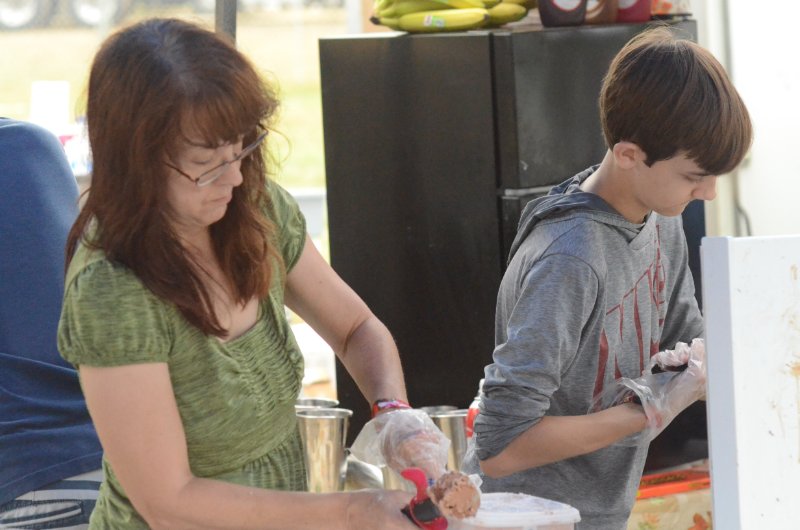 A lean, blonde boy stood awkwardly, one hand on his hip. His old, green back-pack sat at his feet as he posed in front of his house for the classic first day of school pictures. His red brick house stood behind him, year after year.
A lean, blonde boy stood awkwardly, one hand on his hip. His old, green back-pack sat at his feet as he posed in front of his house for the classic first day of school pictures. His red brick house stood behind him, year after year.
A new haircut for him, a new paint job for the house, bags under his eyes, cracks in the house’s foundation, a clean pressed shirt for him, crisp white window frames for his home — but all of that changed in May 2009.
Junior Khaymen Hoelscher’s whole world went up in flames.
Hoelscher was at wrestling practice when his house caught on fire. His mother was cooking French Fries and turned off the stove, or so she thought.
“Our landlord gave us a faulty stove. It was on recall,” Hoelscher said. “It would look like it was off but still really be on.”
Hoelscher’s family was unaware of the stove’s faults at the time, but after the firemen’s inspection, the recalled stove was determined as the cause of the fire.
That day Hoelscher’s mother went to the bank, leaving his two younger brothers home alone; within minutes, a grease fire started. His brothers ran screaming from their house to the neighbor’s, where they called their mother and the fire department. By the time Hoelscher reached the house, the fire was nearly out.
“The only thing going on in my mind,” Hoelscher said. When he saw the fire “was just a perpetual state of disbelief.”
But as he began to piece the details together, he understood the reality of the situation. There were three large fire trucks and two whining ambulances in what was once his front yard. One of his younger brothers was standing in his boxers in front of the now misshapen house, huddling near his mother.
As the house crumbled and the flames went out, Hoelscher stepped on a path that would redefine his entire life.
The firefighters said it was safe to go back into the house and Hoelscher and his family began to sift through the rubble for any salvageable items.
“It was all blackened and ashy [inside the house]. But more than anything I saw, the smell was overwhelming,” Hoelscher said. “It was very smoky, but at the same time damp. It was kind of like sulfur.”
Hoelscher’s family did not have renter’s insurance, so all of their possessions were lost. When Hoelscher was able to go into his hose-drenched room in the basement, he scavenged for any remaining personal possessions.
“I didn’t find much. I grabbed a few pictures and an old stuffed animal. A lion that I had since I was, like, two,” Hoelscher said. “I also took out these [paint] brushes that I got for my birthday from my grandfather that were his when he was young.”
Hoelscher said he turned to art as a way to take his mind off things, drawing muscly figures and picturesque skylines. He found more joy in the creation and imagination than in buying and collecting possessions that, after a while, he would become bored with.
“The fire really changed my view on things,” Hoelscher said. “After it happened, I stopped caring about my stuff.”
He said losing everything taught him an important lesson about the meaningless clutter people accumulate throughout their lives. Almost immediately after losing everything, he looked at his life more carefully and changed what displeased him.
Now Hoelscher rejects the classic teenage love affair with materialism. Before the fire occurred, he cared about his belongings and acquired them simply because they made him feel “cooler or more accepted,” by his peers. He believed, as most teenagers do, that stuff could help to attain friends and happiness. But since then, he has left this idea far away. Now, he focuses on attaining what he calls the “basics” — food, water and clothing. This allows him a simpler happiness, leaving him more content with his life, accompanied by the necessities of life and his artwork.
Hoelscher thought the losses in the fire would devastate him because society places a great importance on “stuff,” but he realized he missed almost none of his material belongings.
His friend, sophomore Sara Ashbaugh, said Hoelscher has overcome the trauma of the fire well, to the point where it rarely affects him. But she said this event played a large role in shaping his current personality, especially the worth he places on his possessions.
“I think because of what happened, it’s not just that he has less stuff,” Ashbaugh said, “but that he values what he has more.”
Ashbaugh said sometimes Hoelscher talks about the fire, though increasingly less. She believes emotionally he has recuperated fully, and they have discussed the profound change he went through coming to his simple belief in the basics.
“Because he lost everything,” Ashbaugh said. “He doesn’t take anything for granted, like most teenagers do.”
Hoelscher said he let the wreckage rebuild his life and rid it of its clutter. He left materialism in his ruined bedroom and took with him his love of art and his new path of minimalism.
“Sometimes it feels like [the fire] never happened,” Hoelscher said. “But once you have nothing, you can see what is really important.”
By Maria Kalaitzandonakes
Categories:
House fire changes perspective
February 9, 2012
0
More to Discover


















































































